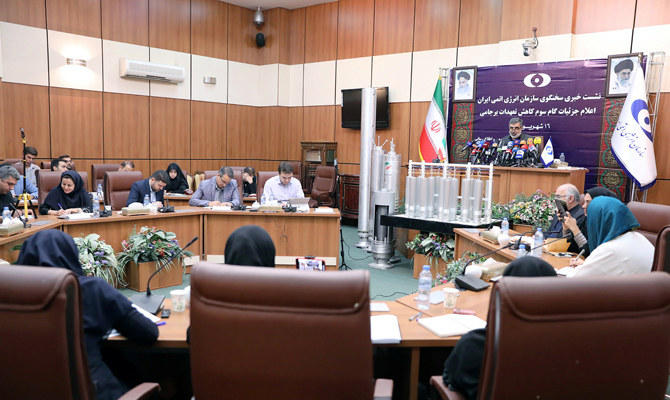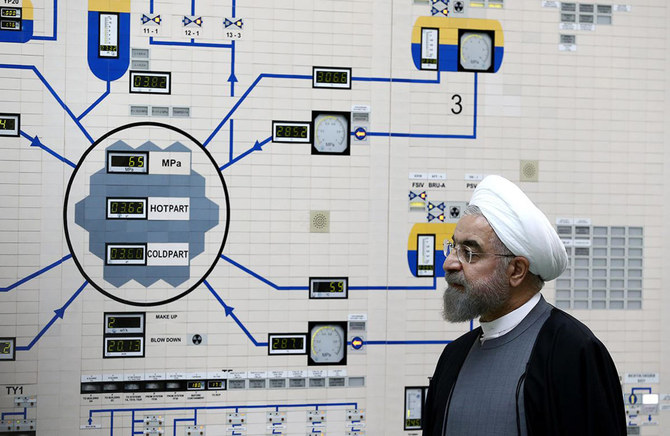TEHRAN: Iran on Saturday activated at least 40 high-powered uranium centrifuges in the most serious breach so far of its commitments under the 2015 deal to curb its nuclear program.
Behrouz Kamalvandi of the Atomic Energy Organization of Iran the country had begun using an array of 20 IR-6 centrifuges and another of 20 IR-4 centrifuges. An IR-6 can produce enriched uranium 10 times as fast as an IR-1, and an IR-4 five times as fast.
The nuclear deal, the Joint Comprehensive Plan of Action (JCPOA), limited Iran to using only 5,060 first-generation IR-1 centrifuges to enrich uranium. By activating advanced centrifuges, Iran further cuts into the one year that experts estimate Tehran would need to have enough material to build a nuclear weapon.
“Iran is capable of increasing its enriched uranium stockpile as well as its enrichment levels, and that is not just limited to 20 percent,” Kamalvandi said in a news conference carried on live television.
“We are capable inside the country to increase the enrichment much more beyond that,” he said. He spoke from a podium with advanced centrifuges standing next to him.
However, he stressed that Iran would allow UN inspectors to continue to monitor sites in the country. A top official from the UN’s International Atomic Energy Agency was expected to meet with Iranian officials in Tehran on Sunday.
Iran also plans to have two cascades, one with 164 advanced IR-2M centrifuges and another with 164 IR-5 centrifuges, running in two months, Kamalvandi said. A cascade is a group of centrifuges working together to more quickly enrich uranium.
Iran has already increased its enrichment up to 4.5 percent, above the 3.67 percent allowed under the deal, and it has gone beyond its 300kg limit for low-enriched uranium.
The staged breaches of the JCPOA are widely viewed as a form of nuclear blackmail, to pressure European signatories to the deal to find a way for Iran to avoid US sanctions.
“If Europeans want to make any decision, they should do it soon,” Kamalvandi said. “Our plan is that if the other parties act on their commitments, we, too, return to our commitments.”
The UN’s International Atomic Energy Agency said it was aware of Iran’s announcement and “agency inspectors are on the ground in Iran and they will report any relevant activities to IAEA headquarters in Vienna.”
The acting head of the IAEA, Cornel Feruta, is expected in Tehran on Sunday for talks with nuclear chiefs and Foreign Minister Mohammad Javad Zarif.
US Secretary of Defense Mark Esper in a joint press conference with his French counterpart, meanwhile said, “I am not surprised that Iran has announced a violation of the nuclear agreement again.”
“We seek to push Iran to respect the nuclear deal,” French defense minister Florence Parly said.
The US and European moves to strengthen security in the Gulf must be "complementary and well coordinated", she added.
France has ruled out joining a US-led coalition of countries protecting oil tankers and cargo ships from threats posed by Iran in the Strait of Hormuz, but has pushed for a European alternative.
Tensions between Iran and the US have risen in recent months that have seen mysterious attacks on oil tankers near the Strait of Hormuz, Iran shooting down a US military surveillance drone and other incidents across the wider Middle East.

















